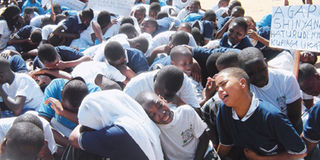SPECIAL REPORT : Breaking the silence on rape through drama and education

Schoolgirls take part in a campaign against gender based violence.
What you need to know:
- This was made evident after residents of Mwembeni Village in Pangani District watched the screening of a film on gang rape.
- The story line revolves around a young, ambitious business woman based in Dar es Salaam who returns to her home village to attend her sister’s wedding and ends up being gang raped by her ex-boyfriend and a few cronies of his.
Pangani. The power of film should not be underestimated in portraying sensitive issues.
This was made evident after residents of Mwembeni Village in Pangani District watched the screening of a film on gang rape.
The story line revolves around a young, ambitious business woman based in Dar es Salaam who returns to her home village to attend her sister’s wedding and ends up being gang raped by her ex-boyfriend and a few cronies of his.
The main character refuses to keep silent over the matter and pursues legal channels in the search of justice.
The film ‘Aisha’ depicts the stigma, shame and blame victims face, and how this prevents women and girls from speaking out on gender-based violence.
The production aims at encouraging women and girls to speak up and break the silence over rape and other forms of assault.
“Everyone else would rather turn a blind eye to rape , but Aisha decides to fight a tough battle for justice,” said Dr Vera Pieroth, executive director of Uzikwasa, the organisation that produced the film.
Uzikwasa Programme Officer Salvata Kilanga said after the screening of the film in Pangani last year, one woman decided to take action and report a rape she had suffered years ago. She made the decision during a training programme organised by the same organistion for women on gender based violence.
“We did not expect such a swift response and we are happy that the film made a positive impact against an atrocity that occurs almost daily,” Dr Vera Pieroth said.
After watching the same film a 30-year-old housewife married to a farmer found the guts to abandon her matrimonial home over the fact her husband was defiling their only daughter aged 13.
It is not yet very clear why she left their daughter with her husband while the village committee claims to be sorting out the issue.
In a report released by the Tanzanis Media Women’s Association (Tamwa) this year it revealed that the rape of schoolgirls was mainly fuelled by poverty, superstition and drunkenness.
According to another study carried out in the country most rape incidences were by males known to the victim in 92 per cent of the cases and over 83 per cent of the perpetrators were either closely related to the victim.
During the screening of the film in Pangani last year, a number young men felt that gang rape otherwise referred to as ‘mtungo’ should go on to teach arrogant girls a lesson.
A village leader at Kimang’a, Mr Athumani Omari Muhando, admitted that gang rape is a stark reality in his village and refers to it as a sickness that should be dealt with full force.
“People know what is happening, but do not report the crime. If two or three people could be reported and eventually punished according to the law that would make a big impact,” he says.
He added that in general village leaders hardly have any powers and riled against the habit of families opting to settle rape related incidences outside court.
One of the major problems that has held back people from reporting rape is the lack of trust of law enforcement agencies.
According to a police officer Tumwagile Nsule, in charge of the gender desk at Pangani specialised training of has helped police officers handle reports on rape better.
Statistics made available from Uzikwasa and the police, the number of reported cases has increased dramatically from 21 between January 2014 and December 2015 to 28 in the first six months of this year.
Ms Msule said that ten new cases are currently at the court while the lack of evidence discarded 18 cases.
Reluctance and outright refusal to give evidence in court have been pinpointed out as one of the setbacks in the fight against rape in society.
According to the World Health Organization (WHO), rape is one of the key barriers to sexual health that many women face throughout the world.
Generally speaking rape is a well-recognised risk factor for a variety of physical, reproductive, medical and psychosocial health problems that may result in immediate or long-term consequences.
Although highlighted as a universal problem regardless of the development status of a nation, there is still scanty literature on rape from the less developed countries including Tanzania.
Most of the available information on rape in Tanzania comes from small unpublished and institution-based studies.
Recently, there has been a growing concern from the media, NGOs and the public about the possible fast increase of incidents of rape against women in the country.
Crime statistics indicate that between 1990 and 1995, about 756 incidents of sexual assault involving young women and girls were reported throughout the country and 48 per cent of these were committed in Dar es Salaam alone.
Parliament passed the Sexual Offences Special Provisions Act of 1998 in an effort to halt the perceived rise in sexual assault incidents.
Prior to the 1992 amendments, both rape and defilement carried a maximum sentence of only five years in jail.
To further protect children, the maximum sentence for defilement was raised to 30 years in 1992.
But the courts have given lesser sentences, leading to activists’ calls for the laws to be reviewed once again.
Rape used to be legally defined in Tanzania as having carnal knowledge of a female over 14 years without her consent, while defilement was defined as having carnal knowledge of a girl below the age of 14 years. The age for defilement was raised to 18 unless the girl is a man’s wife.
Pangani residents who had converged at the Old Boma grounds to watch the film, which featured a number of local artistes, largely remained silent.
Screening of the film was part of a programme to sensitise villagers to resent rape and take action against all forms of gender based violence.
Programme officer with Uzikwasa Kennedy Mashema said the response from villagers was encouraging as residents had never thought of reporting rape to relevant authorities before.
He says an individual may not be ready to change but the society could influence an individual to change by adapting tough stances.
According to some residents and religious leaders the village leadership system was one of the weak links in the struggle to break the silence. The leaders are accused of encouraging families to settle rape cases out of court.
Ward Executive Officer at Kimang’a Hamad Wasaa says he has never seen anyone come forward to report a rape case.
“Officially, I can say that there are no rape cases that have been reported. I live in a society and where I know women and girls are assaulted but nobody dares to report or volunteer to give evidence,” he laments.
He thinks Uzikwasa should be given more support to educate more people on the evils of rape.
According to Uzikwasa officials, the organisation gets support from the district government.
District officials from the Education and Community Development department participated in the campaign as facilitators in training programmes organised by Uzikwasa.
An actor with Sakura Village Arts group, Ms Leila Soud Rashid thinks more awareness is needed to enable people, government leaders and police to act against rape.
A youth, Mr Daud Tito Nagale, 32, who also resides at Sakura says that people are beginning to shun ‘mtungo’ after sensitisation by Uzikwasa through training and drama. “I think the community needs to change and discard such ghastly deeds,” he said.
Dr Pieroth said that two years ago when they started to agitate against bender based violence some people thought they were crazy attacking a ‘culture’ that is so ingrained in the society. “They are now seeing the practice as a crime and are starting to take action,” she says.
Following the change of mind-sets since the beginning of the screening of the film, Uzikwasa hopes that there would an increase in reporting of gang rape or gender violence incidents in general and agreeing to appear as witnesses in such cases to send the rapists into jail.
Dr Pieroth revealed that school committees trained by the organisation are currently establishing a system that is safe for children to report against sexual abuse without fear.
“Through our multimedia campaign and the interactive programmes on Pangani FM radio, we hope to succeed in breaking the silence and prove that our campaign was not in vain,” Dr Pieroth says.
The rape of women and children is recognised as a health and human rights issue in Tanzania and internationally.
Exploration of the prevailing perceptions in rural areas is needed in order to expand the understanding of sexual violence in the diversity of Tanzania’s contexts.
Violence against women and children has gained international recognition as a grave social and human rights violation over the last few decades.
The underlying causes and contributing factors of violence against women and children are deeply entrenched in community traditions, customs and culture.
Gender based violence refers to violence that occurs within the context of women’s and girls’ subordinate status in society characterised by power imbalance in the home and society at large occurs on a vast scale and takes different forms throughout women’s and children’s lives, ranging from Child Sexual Abuse, early marriage, female genital mutilation, rape, forced prostitution, and wife battering, to the abuse of elderly women engaged with “violence against women”; however, the latter is a more limited concept.
This study focuses on rape against women and children, for which we used the term “sexual violence”. Rape was defined as sexual contact that occurs without the woman’s consent, involves the use of force, threat of force, intimidation, or when the woman was of unsound mind due to illness or intoxication and involves sexual penetration of the victim’s vagina, mouth or, rectum.
Globally, it is estimated that between 14 per cent and 25 per cent of adult women have been raped and the prevalence of CSA varies between 2 per cent and 62 per cent.
In Tanzania, physical or sexual violence by an intimate partner is reported by 44 per cent of ever-married women aged 15-49 years.
The same survey showed that 39 per cent of the total sample of ever-married women reported having experienced physical violence, while 20 per cent of the total reported having experienced sexual violence in their lifetime.
Nearly one in three females and approximately in Tanzania have experienced sexual violence and almost three-quarters of females have experienced physical violence prior to the age of 18.
Fear of being blamed for both reporting rape and the stigmatisation of women for the rape they experienced was perceived as a powerful hindrance for disclosure of rape.
Women’s fear of their partner’s reactions and concerns about the family’s reputation were also barriers to disclosure of rape. Reporting rape and making the act known publicly was perceived to shed shame and dishonour on families.




